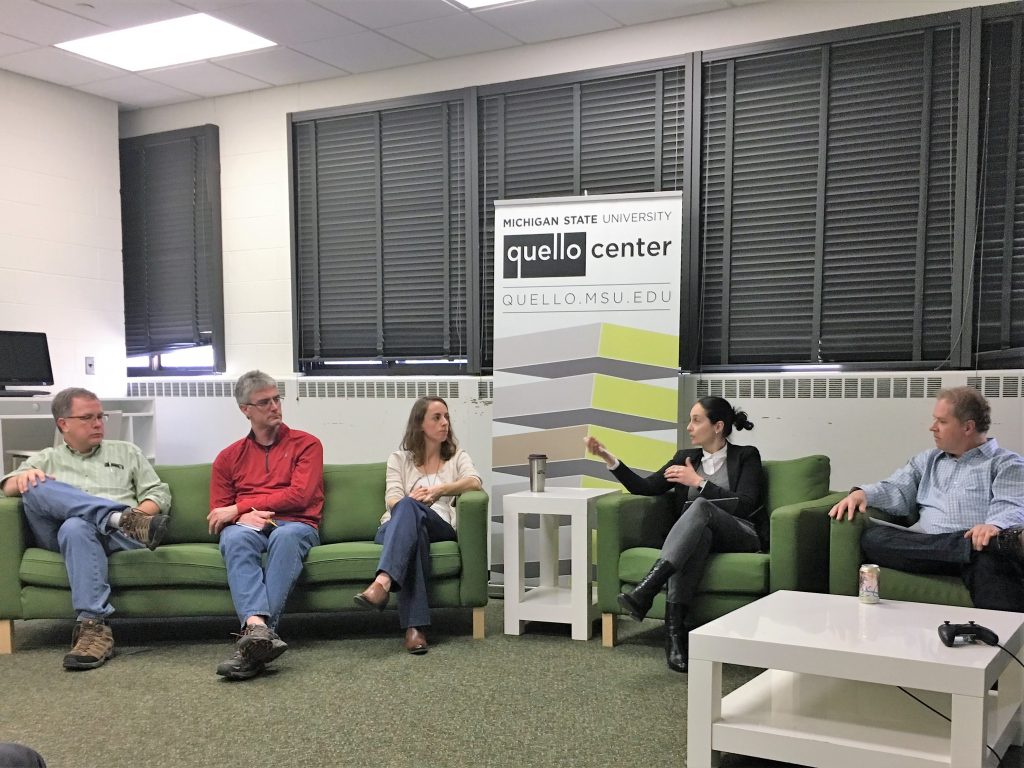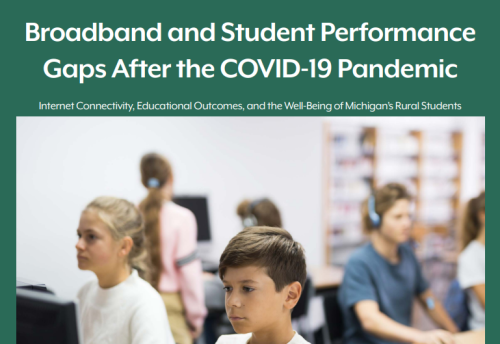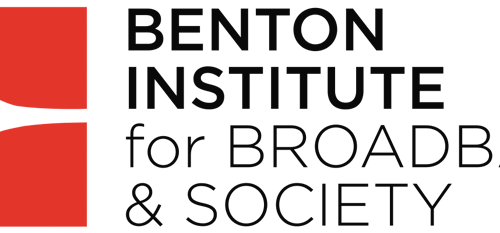On Wednesday, November 29, the Quello Center hosted a discussion advancing policy and governance as a College focus area. This college-wide panel on media & communication research and policy discussed how policy is related to and involved in research activities across the College of Communication Arts and Sciences, as well as what kinds of synergies we can leverage across the college. The discussion served as an opportunity to bring together faculty and students with an interest in policy and governance as an important focus area for the College.
Moderator: Johannes M. Bauer, Department of Media and Information
Panelists: Daniel Bergan, Department of Communication; Dave Ewoldsen, Department of Media and Information; Keith Hampton, Department of Media and Information; Natascha Just, Department of Media and Information; Bibi Reisdorf, Quello Center.

Panelists (from left to right) Dave Ewoldsen, Department of Media and Information; Daniel Bergan, Department of Communication; Bibi Reisdorf, Quello Center; Natascha Just, Department of Media and Information; Keith Hampton, Department of Media and Information
Attendees: Shelia Cotton, Laleah Fernandez, Maria Lapinski, Dar Meshi, Jef Richards, Nora Rifon, Ashly Sanders-Jackson, Ruth Shillair, Rick Wash, Aleksandr Yankelevich
Unable to attend, but mentioned interest: Rachel Mourao, Kjerstin Thorson
*The following summary is organized by themes rather than chronological.
How can we make sure policy issues get the attention they deserve in both research and teaching?
Panelists and attendees discussed a broad range of tactics and strategies for gaining attention on policy topics ranging from informal (yet centralized) information sharing through the Quello Center to PhD training and culture changes at the college level (e.g. valuing policy-directed output for the tenure process). For example, better sharing of information, more cross departmental collaboration, and making everyone more aware of the policy implications of their research.
One panelist started the conversation by saying that perhaps it shouldn’t be the goal of research to gain attention because such efforts can jeopardize the objectivity of the research we do. From this view, the appeal of political gain, financial gain, and media attention have the capability of casting an academic into the role of being an “expert” even in areas that fall outside the boundaries of his/her expertise. In these cases, academics can do more damage than good or lose academic credibility.
One panelist suggested that we begin by finding a common ground, proposing the Quello could serve as a basis for that common ground. She pointed out that it is important to harness the reputation of the Quello Center and the College and to create the value of policy research. She warned that finding a common ground for policy research is not an easy task, pointing out “we all have different mind sets about how to engage in policy,” for example, describing policy or advocating are two very different approaches and the way we ask questions when policies are the object of analysis are different from questions that analyze something societal that might be relevant for policy. The starting point, therefore, might be the distinction between policy-focused research and policy-relevant research.
One panelist provided very pragmatic answers to this question. She noted a number of opportunities available through the Institute of Public Policy and Social Research (IPPSR) ranging from the Michigan Applied Public Policy Research grant to policy-focused learning opportunities for new and existing lawmakers as well as faculty. The IPPSR, for example, runs regular workshops for faculty who want to make their research more applicable to the policy realm. At the federal level, she suggests a college-wide effort to boost presence at the TPRC Research Conference on Communications, Information and Internet Policy in Washington D.C. as well as other similar conferences that bring together researchers, industry and policymakers.
The moderator pointed out that one challenge in the department is communicating clearly when the competition over ideas gets complicated. He added that politically some groups are doing a better job in that space, while academia appears to be generally unsure of their role. One attendee said that academics have a long tradition of playing an advisory role, and as long as technology is advancing new policy will be created, reactively. There is a space for academics to fill here. Another approach, as suggested by one panelist, is training the PhD students to appreciate how their work is important to potentially impacting policy. This concept could be included as we are currently restructuring the PhD program.
What is the difference between policy-relevant research and policy-research and why does it matter?
Concern over a lack of definition, ambiguous definitions and a negative connotation associated with the term policy research was echoed throughout the discussion. One attendee noted that the definition of policy-relevant research and policy research is very much a function of one’s position, perspective or discipline. Thus, all the research in the building is policy relevant, from these varying positions. His suggestion: work toward a shared definition, or change the terminology. The need for changed terminology is rooted in the stigma associated with the term “policy research” (with some colleagues in the communication field). One panelist similarly suggested that not only are definitions based on discipline, but so are the questions that are asked. She added that these questions of policy apply to multiple levels, and there are different areas of policy to consider.
Another atendee later added that it is difficult to move issues forward with a lack of consensus. Her suggested solution is to examine models for engaging with policy centers and advocating for engaged scholarship. Another attendee added that we figure out ways to keep our thumb on the pulse in terms of advocacy work, more specifically, she called on faculty to “know what the advocates are trying to figure out,” to help guide our research. One panelist warned that mixing advocacy and research had the potential to muddy objectivity. One attendee countered that it is possible to balance both, admitting that in her own research her ultimate goal is to see the world become a little better.
While a shared definition of policy-relevant and policy-focused research was not explicitly agreed upon there was consensus among panelists and participants that in some way everyone was doing work that was policy relevant. In other words, policy can be expressed at multiple levels, in countless contexts and through various lenses – it can mean law making, it can mean interpreting existing law, it can be normative behaviors and cultures, it can be pre-emptive or reactive. As such, in our research an organic expression of and relationship to policy tends to emerge, even in the absence of intention. This idea, therefore, lends itself to ways to deliberately nurture and articulate that policy relevance by devising shared techniques and best practices.
One attendee noted that, for some, policy includes law, regulation, code, social norms and culture. From this perspective, law is used as a back-up when norms and culture don’t work. Other attendees and panelists echoed this idea noting that American politics do not necessarily combine studies of a sociological nature with policy decisions, whereas other countries throughout Europe do.
What is the role of communication arts and sciences in policy (relevant) research?
The role of communication arts and sciences in policy research was another area that was highly dependent on one’s discipline, training, goal and comfort level. For example, one panelist pointed out that some communication scholars are sociologists, and from his perspective there is “no natural entry point” for policy focused research, adding that there is a difference between advocates and academics. However, even in the absence of advocacy work there is a place for communication scholarship in the production and distribution of data in multiple public outlets. He added that there are risks associated with aligning our research interests to policy issues because you may be called upon to speak to related issues — not necessarily within your area of expertise. He asks “do you become a communicator of ideology” or “stay in your lane, acknowledging the borders of your expertise?” This panelist asked others, if we head down this road “are we vulnerable to stepping beyond our safe spot?”
However, another panelist pointed out that in communication studies the focus on psychology has a history of policy implications. For example, the role of psychology in understanding the impact of information on people and policy implications of such impacts. This relationship is evident in areas of study such as media policy, press restraints and the public’s reaction to such restraints, and product placement research. This panelist added that there are a number of models and theories in the field that can be and are used to understand and predict public reaction to information, and used to influence policy. One specific example described to illustrate these points is a study of the under reporting of the media on the impact of alcohol in criminal behavior.
While some panelists and attendees shied away from the idea of expressing their research expertise in addressing policy issues, others quickly and deliberately position themselves to be heard by decision makers. One attendee summarized by saying “policy will happen regardless of whether we weigh in or not, best to contribute what we know,” to help informed decision making. He noted the value of the advisory role as academics and noted that research focused on the process of technology development (or restriction of development) is particularly relevant to policy research. More specifically, “understanding how tech gets built, or restricted” leads to a better understanding of influencing factors related to policy outcomes.
Panelists suggested a number of areas where communication and media research could contribute including: changes of values, networking, regulations of Internet platforms, tolerance, diversity, digital inequality, role of technology in inequities, how technology is altered and exasperated by policy, how social media change policy, understanding how tech are being created and how people use technology.
Some specific examples of ongoing work in these areas, as cited by attendees and panelists included: research around algorithms to improve social outcomes; the role of communication studies related to perceptions of the world through the lens of social media, and how that perception by lawmakers influences policy. Another example is how major digital companies, such as Amazon, intentional and directly influence policy. Another panelists concluded by saying “policy research can also be used to call B.S. on existing arguments.”
How can we create a thematic focus in the college to increase impact?
The group as a whole agreed that continued discussions and long-term effort with this goal in mind are necessary to create this thematic focus. Such efforts could and should be directed and overseen by the Quello Center.
One attendee said such a thematic focus should consider ways to influence people who have questions in order to create better interventions. Another attendee said college-wide collaboration from multiple perspectives will provide a starting point for this goal. Another attendee suggested the model used by the Health and Risk Communication Center (HRCC). More specifically, she described a rotating research core that involved policy research that brings in tangential people to focus activities more closely to policy relevance and social translation. She also reminded attendees and panelists that Michigan Environmental Science program, and infrastructure, is readily accessible yet under-utilized source for CAS faculty.
One panelist suggested that an overall awareness of policy relevance is a reasonable first step. More specifically, he proposed that the recognition that there are policy implications to the research that we are already doing is one way to start developing this theme. For example, research that looks at how to handle people playing Pokémon Go might result in the restriction of public spaces from your research perspective, whereas another researcher might say it is better to facilitate this gathering in public spaces for the sake of democratic deliberation and encouraging a public sphere. This example prompted one attendee to chime in by saying, from his perspective, research into the constitutionality of restricting such spaces is yet another perspective. This dialogue further emphasized the ubiquitous nature of policy research and the varying definitions based on individual perspectives.
Some discussed the need to prioritize. One attendee conceded that through our research we can get a fairly descriptive picture of policy and social issues, but having a perfect models doesn’t allow people to make good decisions. From a pragmatic perspective, she adds, we have to prioritize areas of greatest concern.
The moderator brought up the challenge of the dynamic nature of socio-technological systems. He cautioned against the assumption that components of such systems are stable, citing the instance of Smart Cities research and traffic jams. One panelist said that some models can account for that type of change or instability.
In terms of next steps, one attendee suggested that we focus on translation and bring together faculty to discuss and decide upon models that are most effective. The idea here is to move research into the hands of people who can use it. She suggested that events like Brews and Views have been successful in other areas of research and might work for our purposes as well.
How can we improve our presence in policy (relevant) research across MSU?
Formal and informal information sharing networks, in combination with ongoing discussions, led by the Quello Center, are necessary to improve our presence. The moderator suggested that Quello take the lead in bringing together people of practice and policy.
One panelist suggested that we leverage existing resources at the University, specifically utilizing connections with the Institute of Public Policy and Social Research (IPPSR). This center has a number of mechanisms for direct interaction with law makers including: monthly forums and round tables to inform current legislators and staff of timely issues and research at MSU, learning opportunities for new lawmakers, and small grants available for policy relevant research that is shared with lawmakers upon completion. One attendee echoed this call, noting that she makes a deliberate effort to interface with decision makers whenever possible through her internal network of contacts and strategic choices about conference attendance. More specifically, she chooses conferences in which she knows that lawmakers, and agency heads will be attending. She adds that the academic culture is not exactly conducive to this approach of information sharing and collaboration, in fact, within academic circles she has been criticized for her choice to interface and engage regularly with policy makers.
Another attendee suggested using HRC workshops to communicate research and draw attention. She also noted that additional forums to talk about the ways to communicate research and draw attention and developing or identifying better resources to get the word out.
One attendee shared efforts (pre-2016 election) to collect information directly from FTC employees and compile a book of issues that “kept them up at night.” Despite the utility of this information, she noted that there currently is not an appropriate or useful venue to share this with colleagues or faculty that might find it useful for their own research, asking “where are the platforms to share this information?” She noted that focusing on public policy and marketing conferences might be one way to reach the intended audience and boost presence in this area.
One attendee said it is necessary to make strategic decisions about where we publish, aiming to publish in journal and publications with a policy-oriented audience rather than a strictly academic audience. She emphasized the importance of translation in academic work, particularly among those in government with questions who are designing interventions. The moderator echoed that it is worth re-examining the way we value published research in the tenure and promotion processes.
One attendee said that we should consider stepping away from the idea that research in this area needs to be cutting-edge and instead think about things that everyone in the field or discipline already knows. Perhaps, these tried and true approaches and models are best applied if we are able to translate for policy purposes. Another attendee added that while our research may not have all the answers, at least it is thoughtful and generally fact driven.
One attendee suggested that we create a pipeline to funnel translated research to broader audiences such as through the New York Times. She added a dedicated journal is also worth considering. Another attendee pointed out that Quello has the potential to be a pipeline, however, it is important to respect relationships that others have developed with policy-makers, public officials or agencies in any such type of information-sharing endeavors.



